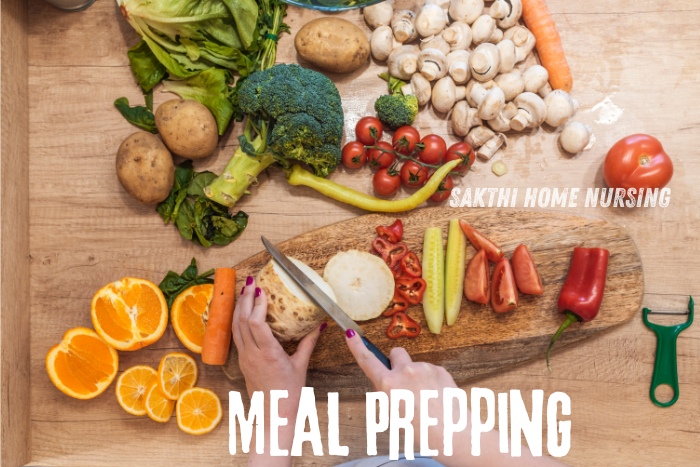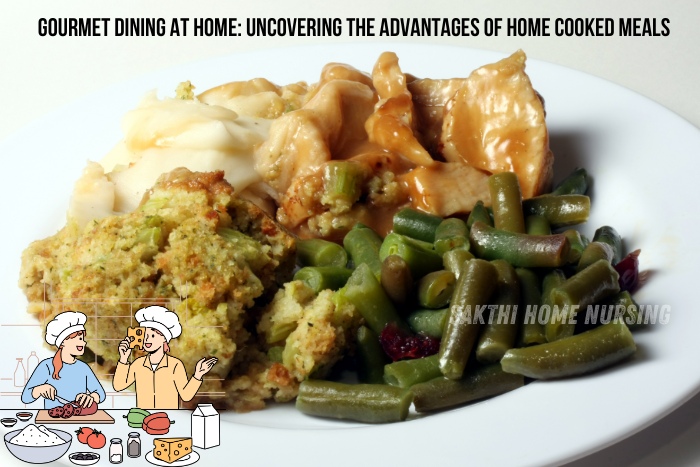It might be difficult to find time for a well-prepared lunch in the fast-paced world of today. When your social life, job, and family pull you in different directions, it’s simple to choose convenience foods like takeout or boxed meals. But there are many advantages to eating food prepared at home, and they go well beyond flavor. At Sakthi Home Nursing Service in Coimbatore, we understand the value of a nutritious, delicious, and lovingly prepared meal at home. Let’s dive into the many advantages of home-cooked meals and how they can transform your dining experience.
1. Healthier Eating Habits
Controlling what goes into your meals is one of the biggest advantages of cooking at home. Making your own food allows you to control portion sizes, choose healthy, fresh ingredients, and stay away from chemicals and preservatives that are frequently included in processed meals.
Nutritional Control
You have complete control over the nutritional value of the food you prepare at home. You may incorporate vital vitamins and minerals together with proteins, carbs, and fats in a balanced manner. Control of this sort is particularly crucial for those with restricted diets or medical disorders like diabetes or heart disease.
Reducing Processed Foods
Cooking at home lessens your dependency on manufactured meals, which are frequently heavy in salt, sugar, and bad fats. Alternatively, you might concentrate on whole meals that are inherently high in nutrients, promoting your general health and wellbeing.
Portion Control
You can better control portion sizes when you cook at home, which can aid in weight management and help you avoid overindulging. For people who are conscious of their calorie consumption, this is especially advantageous.
2. Cost-Effective Dining
Regularly ordering takeout or dining out may add up quickly. Generally speaking, home-cooked meals are far more economical, letting you obtain more for your shopping money while still enjoying tasty and wholesome cuisine.
Buying in Bulk
When you cook at home, you can purchase ingredients in bulk, which is often cheaper than buying single-serve items or pre-packaged meals. Staples like rice, pasta, grains, and vegetables are affordable and can be used in a variety of dishes.
Less Food Waste
Cooking at home also helps to minimize food waste. You can plan meals around the ingredients you already have, ensuring nothing goes to waste. Leftovers can be creatively repurposed into new meals, further maximizing your grocery spend.
Savings on Healthcare
Healthier eating habits can lead to fewer visits to the doctor and lower medical bills. By maintaining a balanced diet through home-cooked meals, you reduce the risk of chronic illnesses that often result from poor dietary choices.

3. Improved Mental Health and Well-being
Cooking and eating at home isn’t just good for your body; it’s also beneficial for your mind. The process of cooking can be a therapeutic activity that helps reduce stress and promotes mindfulness.
Therapeutic Cooking
The act of preparing food can be a relaxing and meditative experience. It allows you to focus on the task at hand, providing a break from the stresses of daily life. The sensory experience of chopping, stirring, and tasting can help you connect with the present moment.
Social Connection
Sharing home-cooked meals with family and friends strengthens social bonds. It provides an opportunity to connect, converse, and enjoy each other’s company in a relaxed environment. These social interactions are vital for mental well-being and can create lasting memories.
Sense of Accomplishment
Successfully preparing a meal, especially a new recipe, can boost your self-esteem and provide a sense of accomplishment. This positive reinforcement can enhance your mood and contribute to a greater sense of well-being.
4. Enhancing Family Bonds
Cooking and dining together as a family is an excellent way to bond and create a sense of unity. It’s an opportunity to teach children valuable life skills, share family traditions, and establish healthy eating habits that will last a lifetime.
Family Involvement
Involving children in the cooking process can be a fun and educational experience. They can learn about different foods, where they come from, and how to prepare them. This hands-on experience encourages healthier eating habits from a young age.
Passing Down Traditions
Home cooking allows you to pass down family recipes and traditions to the next generation. These recipes often carry memories and stories, preserving your family’s cultural heritage.
Quality Time
Sitting down to a meal together provides valuable quality time that can strengthen family relationships. It’s a time to discuss the day, share stories, and enjoy each other’s company without distractions.
5. Supporting Local Economy and Sustainability
By choosing to cook at home, especially with locally sourced ingredients, you’re supporting local farmers and businesses. This not only boosts the local economy but also promotes sustainability.
Buying Local
Purchasing ingredients from local markets reduces the carbon footprint associated with transporting goods over long distances. Local produce is often fresher and more nutritious, as it doesn’t need to be preserved for long journeys.
Seasonal Eating
Cooking at home allows you to take advantage of seasonal produce, which is often more affordable and flavorful. Seasonal eating supports local agriculture and reduces the demand for out-of-season imports.
Eco-Friendly Choices
Home cooking enables you to make eco-friendly choices, such as reducing packaging waste, composting food scraps, and choosing sustainably sourced ingredients.
6. Exploring Culinary Creativity
Cooking at home opens up a world of culinary possibilities. You can experiment with different ingredients, flavors, and cuisines, turning your kitchen into a creative space.
Experimenting with Recipes
Home cooking gives you the freedom to experiment with new recipes and ingredients. You can tailor dishes to your taste preferences and dietary needs, or even invent your own recipes.
Learning New Skills
Each time you cook, you have the opportunity to learn and improve your culinary skills. Whether it’s mastering a new cooking technique or discovering how to pair different flavors, cooking at home is an ongoing learning experience.
Cultural Exploration
Trying recipes from different cultures can be a fun way to expand your palate and learn about other traditions. It’s a way to travel the world without leaving your kitchen.

7. Tailored to Individual Preferences
When you cook at home, you can cater to the specific dietary needs and preferences of everyone in your household. Whether someone has a food allergy, follows a particular diet, or just prefers certain flavors, home cooking allows you to accommodate these needs.
Customizable Meals
Home cooking allows you to easily customize meals to suit individual preferences. You can adjust the spice level, substitute ingredients, or create different versions of the same dish to satisfy everyone’s tastes.
Accommodating Dietary Restrictions
For those with food allergies or dietary restrictions, cooking at home is often the safest option. You can control every aspect of the meal, ensuring it meets the necessary dietary guidelines.
Satisfying Cravings
When a craving strikes, cooking at home means you can satisfy it exactly the way you like. Whether it’s a rich chocolate cake or a comforting bowl of soup, you can create your favorite dishes whenever you want.
8. Fostering Healthy Eating Habits in Children
Children who are involved in cooking at home are more likely to develop healthy eating habits. They’re exposed to a variety of foods and learn the importance of nutrition from an early age.
Encouraging Balanced Diets
By cooking at home, you can ensure your children are eating a balanced diet that includes a variety of fruits, vegetables, whole grains, and lean proteins. This sets the foundation for a lifetime of healthy eating habits.
Teaching Valuable Skills
Cooking with your children teaches them valuable life skills, such as how to plan meals, follow a recipe, and prepare food safely. These skills will serve them well as they grow older and begin to cook for themselves.
Promoting a Positive Relationship with Food
When children are involved in the cooking process, they’re more likely to develop a positive relationship with food. They learn that food is not just for nourishment, but also for enjoyment and creativity.
9. Convenience Without Compromise
Many people believe that cooking at home is time-consuming and inconvenient, but with a bit of planning and the right tools, it can be a breeze.
Meal Prepping
Meal prepping is an effective way to save time in the kitchen. By preparing ingredients or entire meals in advance, you can quickly put together nutritious dinners during the week without much hassle.
Utilizing Kitchen Gadgets
Investing in quality kitchen gadgets, such as a slow cooker or pressure cooker, can make home cooking more convenient. These tools can reduce cooking time and effort, allowing you to enjoy home-cooked meals with minimal fuss.
Planning Ahead
Planning your meals for the week can streamline the cooking process. It ensures you have all the necessary ingredients on hand and helps you avoid the stress of last-minute decisions.

Conclusion
There’s no denying the numerous benefits of home-cooked meals. From improving your health and saving money to strengthening family bonds and supporting the local economy, cooking at home is a practice worth embracing. At Sakthi Home Nursing Service in Coimbatore, we encourage everyone to explore the joys of home cooking. Whether you’re preparing a simple meal or creating a gourmet dining experience, the rewards are plentiful.








